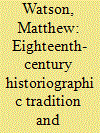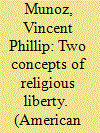| Srl | Item |
| 1 |
ID:
118951


|
|
|
|
|
| Publication |
2013.
|
| Summary/Abstract |
This article focuses on Adam Smith's largely sympathetic response to the Rousseauian critique of the moral degeneracy of modern 'economic man'. It thus emphasises his philosophical ambivalence towards commercial society over the textbook IPE presentations which ascribe to him an almost wholly unreflexive market advocacy. In doing so it provides important methodological lessons for the study of Everyday IPE today. Arnaldo Momigliano has identified a decisive break in historical method in the eighteenth century, of which Smith and Rousseau were key exponents. However unwittingly, contemporary Everyday IPE scholars are the spiritual heirs of the eighteenth-century move from writing public histories of the state to writing private histories of unnamed individuals who embody the most recent phase of human sociability. The eighteenth-century economic man was conceptualised in relation to evolving forms of economic organisation, where the economy in turn was thought to reflect the prevailing system of 'manners'. Smith united with Rousseau in the belief that their society's bourgeois politeness allowed materialist ideologies to corrupt the moral autonomy of the individual. The historical method underpinning such concerns also allows Everyday IPE scholars to ground similarly-styled attempts to understand threats to moral autonomy arising from the struggle over economic surplus today.
|
|
|
|
|
|
|
|
|
|
|
|
|
|
|
|
| 2 |
ID:
147246


|
|
|
|
|
| Summary/Abstract |
Due in part to the influence of Michael McConnell, free exercise exemptionism is generally thought to be compatible with, if not dictated by, the founders’ church-state political philosophy. This article rejects that position, arguing instead that America's constitutional tradition offers two distinct conceptions of religious liberty: the founders’ natural rights free exercise and modern moral autonomy exemptionism. The article aims to distinguish these two approaches by clarifying how they are grounded upon divergent philosophical understandings of human freedom and by explaining how they advance different views of what religious liberty is, how it is threatened, and, accordingly, how it is best protected. The article also attempts to demonstrate how our modern approach expands the protection for religious liberty in some ways but limits it in others.
|
|
|
|
|
|
|
|
|
|
|
|
|
|
|
|